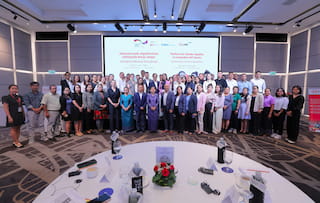LABS, GIZ, and FABRIC Cambodia Host Workshop on Addressing Gender-Based Violence in Cambodia’s Garment Sector

The Life and Building Safety (LABS) Initiative, GIZ, and FABRIC Cambodia successfully hosted the Platform for Gender Equality in Apparel & Footwear in Cambodia workshop, bringing together government representatives, industry leaders, trade unions, and civil society organizations to address the pressing issue of gender-based violence and harassment (GBVH) in the garment and footwear sector. This marked the second year LABS organized the event to promote safer and more equitable workplaces.
The workshop shed light on the persistent challenges faced by Cambodia’s garment sector, which remains a key driver of the nation’s economy. GBVH continues to disproportionately affect female workers, compromising their well-being, reducing productivity, and incurring significant economic costs. Inadequate reporting mechanisms, and a lack of coordination among stakeholders were highlighted as key barriers to addressing the issue.
Government representatives, including Her Excellency HOU Samith, Secretary of State, Ministry of Women’s Affairs, and Her Excellency NHEAN Sochetra, Director General of the Ministry of Women’s Affairs, outlined the government’s commitment to tackling GBVH through initiatives like the Neary Rattanak VI Strategy for gender equality. Industry leaders and civil society experts, including representatives from ILO Better Factories Cambodia and the Cambodian Garment Training Institute, shared actionable insights and successful strategies for preventing and addressing GBVH in the workplace.
The event emphasized the importance of collaboration in addressing GBVH and showcased the role of initiatives like LABS and GIZ FABRIC in driving these efforts. The LABS Initiative, operational in Cambodia since 2022, continues to address preventable fire, electrical, and structural safety risks in factories, benefiting over a million workers across its operational countries. Meanwhile, GIZ and FABRIC Cambodia advances sustainability and gender equity in Asia’s textile and garment industry, promoting improved labor standards and workplace safety.
“Addressing complex challenges such as gender- safety requires collective action from all stakeholders – government bodies, industry leaders, civil society, and workers. By working together, we can build safer workplaces that empowers workers and contribute to the long-term sustainability and growth of the sector,” said Pramit Chanda, Global Director – Textile and Manufacturing, IDH and spokesperson for LABS Initiative.
The workshop concluded with a call to action for all stakeholders to continue their efforts in creating safer and more equitable workplaces for Cambodia’s predominantly female garment workforce.